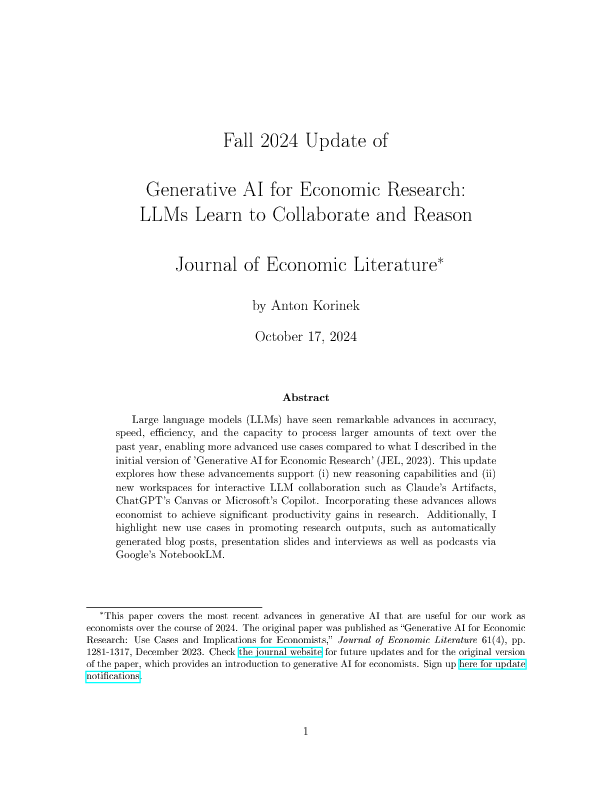JVI Annual Lecture: Labor Market Challenges in the Age of AI
Wednesday, October 16, 2024 at 14:00-15:30 Vienna time (CET)
Guest speaker
Anton Korinek, Professor at the University of Virginia's Department of Economics and Darden School of Business
Rossana Merola, Macroeconomist, International Labour Organization (ILO)
The JVI Annual Lecture was delivered by Anton Korinek, Professor at the University of Virginia's Department of Economics and Darden School of Business and Senior Researcher at the Complexity Science Hub Vienna, and a leading scholar on the economics of artificial intelligence (AI). His presentation centered on the profound economic challenges posed by AI on labor markets, including the potential advent of artificial general intelligence (AGI)— the ability for a machine or system to understand, learn, and apply knowledge across a wide range of tasks at a human-like level of intelligence—with a focus on the Central, Eastern and Southeastern Europe (CESEE) region.
Professor Korinek highlighted AI’s rapid advance, with systems showing, or soon expected to reach, capabilities that approach human-level cognitive skills. AI will thereby fundamentally redesign economies and reshape the nature of work. The dual nature of AI’s impact was covered: it promises to boost productivity and create new industries but will also pose challenges, by displacing both low- and high-skill jobs, increasing wage polarization, and potentially exacerbating inequalities. These advancements, he argued, are likely to reshape economies in ways that demand urgent policy attention, particularly concerning labor markets and income distribution. Governments need to prepare for this disruption by focusing on retraining programs and social safety nets. Introducing new policies to ensure the benefits of AI are distributed equitably, potentially through mechanisms like a universal basic income, must be on the table.
Professor Korinek also touched on the environmental impacts of AI, particularly its high energy consumption, and stressed the importance of aligning AI development with sustainability goals.
The lecture emphasized the critical role of policymakers in ensuring that AI’s transition is smooth and beneficial to society, particularly where institutional resilience may be less robust. Professor Korinek highlighted how AI could potentially address some of the CESEE region’s economic difficulties, such as slow productivity growth and the pressing need for innovation. However, he emphasized that without adequate policies to manage the transition, AI could worsen existing inequalities and further widen the gap between advanced economies and emerging markets. AI offered CESEE countries an opportunity to leapfrog traditional development paths, but doing so requires encouragement by policy, including fostering digital literacy and encouraging private-sector innovation.
Professor Korinek also explored the broader macroeconomic implications of AI on global markets and trade. As AI will accelerate technological change, it may alter patterns of comparative advantage. Countries that quickly adopted AI technologies stand to gain a competitive edge in the global economy, while others risk being left behind.
The Question and Answer (Q&A) session following Professor Korinek's lecture focused on the transformative potential of AI and the economic implications, especially for labor markets and inequality. Participants raised concerns about the social and political risks AI poses, where rapid labor displacement could lead to significant political instability. Questions revolved around practical solutions for managing this disruption, such as retraining programs and addressing inequality. Professor Korinek highlighted the importance of preparing for the transition by equipping workers with AI skills and adjusting social safety nets to mitigate the risks of widespread labor displacement. He also emphasized the need for CEE countries to remain competitive by adopting AI technologies quickly.
Additional concerns included the potential psychological and social impacts of AI-driven job displacement on younger generations, the concentration of wealth in AI-innovating countries, and the environmental costs of AI development. Some participants suggested that AI ownership and production might need to be socialized to ensure equitable distribution of benefits, while others questioned whether the institutional frameworks needed to address these challenges are ready to manage such rapid change. Professor Korinek acknowledged these challenges, reinforcing the need for global collaboration, stronger governance, and proactive policy-making to address both economic and societal risks in an AI-driven future.
Patrick Imam, Deputy Director, Joint Vienna Institute











